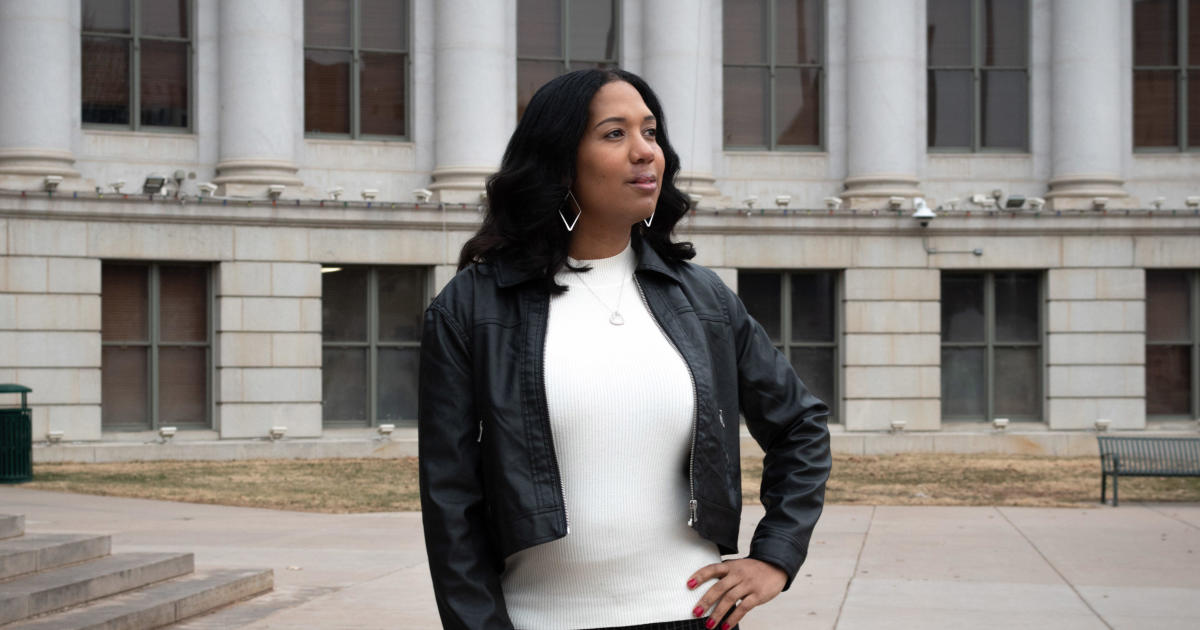CBS News
Colorado legal settlement would raise care and housing standards for trans women inmates

DENVER — Taliyah Murphy received a letter in early 2018 about a soon-to-be-filed class-action lawsuit brought on behalf of transgender women like her who were housed in men’s prisons in Colorado. It gave her hope.
Murphy and other trans women in Colorado had faced years of sexual harassment and often violence from staff and fellow incarcerated people. They were denied requests for safer housing options and medical treatment, including surgery, for gender dysphoria, the psychological distress that some trans people experience due to the incongruence between their sex assigned at birth and their gender identity, according to the lawsuit.
“We were targets for victimizing, whether it was sexual assault, extortion, you name it,” said Murphy, who was released from prison in 2020. Most of the time, she added, “The guards just looked the other way.”
Moe Clark for KFF Health News
A historic legal settlement called a consent decree, expected to be finalized by early March, would establish two new voluntary housing units for incarcerated trans women, making Colorado the first state to offer a separate unit, according to attorneys in the case. A federal law states such units are prohibited unless court-ordered. The plan outlined in the agreement, which received preliminary approval last fall, would mandate the Colorado Department of Corrections pay a $2.15 million settlement to affected trans women; update its protocols and staff training; improve medical and mental health care; limit cross-gender searches from correctional officers; and require corrections staff to use correct names and pronouns for trans women inmates.
A state judge held a hearing on the consent decree on Jan. 4 and is expected to finalize it by early March, after she granted an extension to allow more incarcerated women to be notified of the settlement. Approximately 400 currently or formerly incarcerated trans women are eligible to be beneficiaries.
Housing assignments in U.S. prisons are nearly exclusively made based on a person’s anatomy, despite a federal law outlining that the safety concerns for trans people should be taken into consideration when determining placement. That’s because they are significantly more likely than inmates who are not trans to be sexually or physically assaulted while incarcerated.
“It’s like putting targets on their back,” said Paula Greisen, the civil rights lawyer who filed the class-action lawsuit in 2019 alongside the California-based Transgender Law Center.
The U.S. Department of Justice found in 2014 that incarcerated trans people are much more likely to experience sexual violence behind bars from both staff and other incarcerated people, with 35% of trans inmates reporting having been assaulted in the 12 months prior to taking the survey. A 2007 study of trans women in California prisons found that 59% reported having been sexually assaulted during their incarceration, a rate 13 times higher than for others housed in prisons.
Colorado’s case comes amid a growing number of lawsuits across the country aimed at improving access to gender-affirming care and safety for incarcerated trans people. In a landmark 1994 case, the U.S. Supreme Court ruled that prison officials’ “deliberate indifference” to a prisoner’s safety concerns violates the Eighth Amendment’s “cruel and unusual punishments” clause. Since then, incarcerated trans people have won legal cases against prison administrators in Washington, Georgia, California, and Idaho.
And while a handful of states, including Colorado, have written policies regarding gender-affirming care and surgery, the barriers to accessing care are often insurmountable — an issue the consent decree hopes to address. California became the first state to establish policies on gender-affirming medical care in prisons, providing gender-affirming surgery starting in 2017. In 2019, a three-judge panel ruled that the state of Idaho was required to perform a surgery officials had previously denied. One incarcerated person in Colorado has had gender-affirming surgery, according to a Department of Corrections spokesperson.
The Constitution requires jails and prisons to provide the same standard of care that individuals can access in the community, said Matthew Murphy, an assistant professor of medicine and behavioral sciences at Brown University and a physician who oversees gender-affirming clinical care for the Rhode Island Department of Corrections. (Matthew and Taliyah are not related.)
“With Medicaid and private insurance increasingly covering gender-affirming care,” he said, “there’s a growing precedent.”
There were 148 trans women housed in Colorado prisons as of December 2023, according to a Department of Corrections spokesperson, with nine trans women residing in women’s facilities. Before 2018, trans women were housed exclusively with men. The class-action lawsuit relates only to trans women and does not include trans men, nonbinary people, or intersex people.
The lawsuit was filed after a young trans woman who had previously been housed with girls in a juvenile facility was transferred to an adult men’s prison, where she was brutally raped. Her numerous requests to be housed with other women, citing safety concerns, had been denied. After taking on the woman’s case, Greisen quickly stumbled upon many more trans women who had experienced similar violence. She contacted the Colorado attorney general’s office and governor’s office, but little changed, prompting her to file the class action.
“The Department of Corrections in every state — it’s like trying to turn around the Titanic. There’s so much bureaucracy,” Greisen said. “You often have to sue to get their attention.”
The World Professional Association for Transgender Health, the leading professional organization that sets standards for the medical treatment of people with gender dysphoria, recommends an “informed consent model” that allows patients to pursue gender-affirming care, including surgery, without having to undergo extensive psychological counseling.
But Colorado’s prison system, like many across the country, doesn’t adhere to those standards. Current corrections department policies require trans women to receive multiple recommendation letters from medical and mental health providers to be considered for transition-related surgery. Often, prisons offer gender-affirming care “on paper” but lack qualified providers, making the care impossible to access, according to Matthew Murphy.
That was the case for Taliyah Murphy, who pursued gender-affirming surgery twice during her incarceration. Murphy went to prison in 2009, after a conviction resulting from an altercation with her abusive boyfriend, according to the lawsuit. Her sentence was reduced in 2013, she said.
In 2019, she finally received a recommendation for surgery to treat her gender dysphoria from a corrections department psychiatrist. But she was told that her other medical providers didn’t have the necessary training to evaluate her, according to the lawsuit, which halted the process. She received surgical treatment only after her release from prison in 2020, she said.
Gender dysphoria, left untreated, can result in depression, anxiety, thoughts of self-harm, and suicidality — all of which already affect trans people disproportionately due to the discrimination, stigma, and other social stressors they face. “Those things are generally resolved, or improved at least, by undergoing gender-affirming clinical care — whether that’s medical, procedural, or surgical,” Matthew Murphy said.
But prison systems are dragging their feet in providing treatment, he said, and a national shortage of gender-affirming care providers and surgeons makes matters worse.
“And so, people are then forced to go to the courts,” he said.
The consent decree will create two new voluntary housing options for trans women incarcerated in Colorado to better meet their specific needs and improve their safety.
A voluntary 100-bed transgender unit, whose development is already underway, will be located on the grounds of the men’s Sterling Correctional Facility. For those approved to move to the women’s prison, they will spend a few months in the 44-bed integration unit outlined in the consent decree.
That adjustment time will be critical for both the cisgender women already housed in the women’s prison and the trans women who are likely leaving traumatic situations in the men’s prisons, said Shawn Meerkamper, senior staff attorney for the Transgender Law Center, who worked on the case.
“We have seen in other places when folks are just dropped in a really new environment, it can be a sink-or-swim situation,” Meerkamper added.
Eligibility for the units would be decided on a case-by-case basis by a committee, including medical and psychiatric experts trained in gender-affirming care as well as prison officials, according to the settlement. But regardless of placement, Colorado’s corrections department would still be legally required to provide trans women access to adequate mental and physical health care.
“Trans women should not be forced to go to the trans unit or to a women’s prison if that’s not what they want,” Meerkamper said. “And they cannot be punished or retaliated against for refusing to go.”
In response to the lawsuit, the Department of Corrections has hired an independent medical expert from Denver Health, as well as a gender-affirming care specialist, to help oversee requests for housing assignments and surgical consults.
Taliyah Murphy hopes the new housing units and improved access to gender-affirming care will allow incarcerated trans women to focus less on safety and survival and more on rehabilitation and planning their lives outside prison walls.
“We want them to leave better off than they came in and get the care they need,” said Murphy, who is now a small business owner in Colorado Springs and is pursuing her bachelor’s degree in finance and accounting. “That’s what this is all about.”
KFF Health News, formerly known as Kaiser Health News (KHN), is a national newsroom that produces in-depth journalism about health issues and is one of the core operating programs at KFF — the independent source for health policy research, polling, and journalism.
CBS News
Hurricane Beryl impacts travelers returning from holiday weekend

Watch CBS News
Be the first to know
Get browser notifications for breaking news, live events, and exclusive reporting.
CBS News
Easy and delicious overnight oats recipes to try this summer

Watch CBS News
Be the first to know
Get browser notifications for breaking news, live events, and exclusive reporting.
CBS News
U.S. men’s Olympic soccer team announced. Here’s who made the cut.

The U.S. men’s soccer team roster that will represent Team USA at the Summer Olympics in Paris was released Monday. This is the first time the U.S. men are in the Olympic soccer tournament since 2008.
The 18-man team roster will include defenders Miles Robinson and Walker Zimmerman along with forward Djordje Mihailovic as the overage players. The three players failed to get used by the senior national team that crashed out of at the Copa America in the group stage earlier this month.
Olympic soccer is largely limited to players under 23 years old, with each team allowed only three players over the age limit.
“We couldn’t be more excited to have this group of great players and great people represent us at the Olympic Games,” head coach Marko Mitrović said in a statement. “It’s a special moment for all of us as they have worked their entire lives to reach this stage.”
Fifteen players on the roster have international appearances with the full U.S. men’s national soccer team.
Zimmerman, 31, leads the team with 42 international appearances. He last played for the U.S. against Canada in the June 2023 CONCACAF Nations League Final.
Robinson, 27, was on the U.S. roster for the Copa America but didn’t get any playing time. He had 29 international appearances.
Mihailovic, 25, has 11 international appearances but hasn’t played for the national team since the loss to Panama in the July 2023 CONCACAF Gold Cup semifinal.
Others with senior national team experience are midfielders Gianluca Busio, Tanner Tessmann, and Jack McGlynn; defenders John Tolkin, Kevin Paredes, Caleb Wikey, and Benjamin Cremaschi; forwards Taylor Booth, Paxten Aaronson and Duncan McGuire and goalkeepers Patrick Schulte and Gaga Slonia.
Defenders Maximilian Dietz and Nathan Harriel and forward Griffin Yow have never played for the senior team.
Cremaschi at 19 is the youngest player on the roster and is also age-eligible for the 2028 Los Angeles Olympics.
In the roster, 10 players are from MLS, two each from newly promoted Venezia in Italy and the Dutch Eredivisie and one each from the Premier League, the German Bundesliga, the Germany second tier and Belgium’s top tier. All but Dietz played in MLS at some point or in an MLS development academy.
The alternates named to the roster are goalkeeper John Pulskamp, defender Jacob Davis, midfielder Josh Atencio and forward Johan Gomez.
“We’re grateful to the clubs that released their players in support of our mission,” Mitrović said. “Our goal is to make our country proud and we will give everything for the United States.”
FIFA does not require clubs to release players for the Olympics.
The U.S. men open their tournament play on July 24 against host France, then meet New Zealand and Guinea. The top two nations in each group advance to the quarterfinals.
U.S. men’s Olympic soccer team — full list
Marko Mitrović — Coach
Djordje Mihailovic — Forward
Taylor Booth — Forward
Paxten Aaronson — Forward
Duncan McGuire — Forward
Griffin Yow — Forward
Johan Gomez — Forward (alternate)
Miles Robinson — Defender
Walker Zimmerman — Defender
John Tolkin — Defender
Kevin Paredes — Defender
Caleb Wikey — Defender
Benjamin Cremaschi — Defender
Maximilian Dietz — Defender
Nathan Harriel — Defender
Jacob Davis — Defender (alternate)
Gianluca Busio — Midfielder
Tanner Tessmann — Midfielder
Jack McGlynn — Midfielder
Josh Atencio — Midfielder (alternate)
Patrick Schulte — Goalkeeper
Gaga Slonia — Goalkeeper
John Pulskamp — Goalkeeper (alternate)









